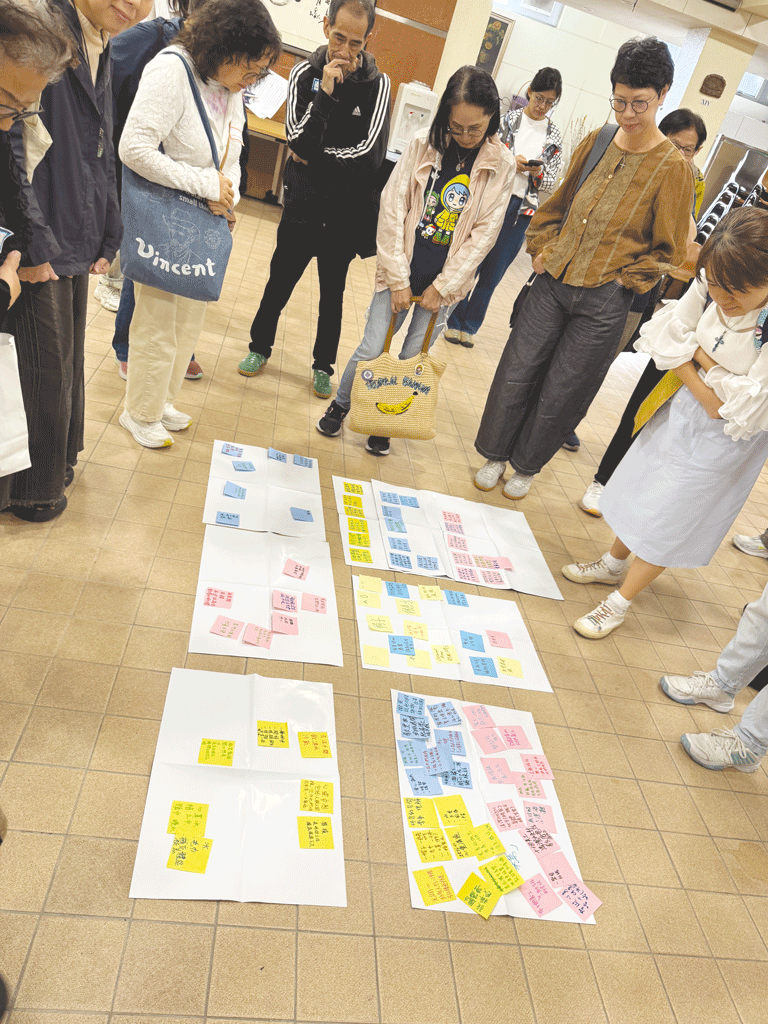HONG KONG (SE): “The most fundamental concern in human nature is to be cared for, understood, and acknowledged. When we reach out and invite them to church for a chat, we can truly see their real needs,” said Father Paul Kam Po-wai, vicar general, during a Mass on November 16, commenting on the rest stations set up by the Commission for Labour Affairs last summer.
This Mass, held at St. Mary’s Church in Hung Hom, marked the 9th World Day of the Poor which has been celebrated by the universal Church on the 33rd Sunday of the year since 2017.
Father Kam encouraged those present to embody the presence of Jesus Christ by accompanying the poor, citing Pope Leo XIV’s message for the day, titled, “You are my hope” [Psalm 71:5], and St. Teresa of Calcutta, who noted that the opposite of love is not hatred but indifference.
Before the Mass, a session highlighted the outcomes of rest stations set up for outdoor workers by the commission in collaboration with three parishes—St. Andrew’s Church in Tseung Kwan O, St. Joseph’s Church in Fanling, and Our Lady of Fatima Church in Cheung Chau—to respond to the theme of the Jubilee Year, “Pilgrims of Hope.”
Father Kam encouraged those present to embody the presence of Jesus Christ by accompanying the poor, citing Pope Leo XIV’s message for the day, titled
Samuel Wong, a policy research officer of the commission, said that the stations facilitated a mutual connection between the Church and the community by opening church spaces as a welcoming environment.
Wong also recalled their outreach in Cheung Chau, which involved providing refuge from the heat and offering smartphone training sessions, both of which received a positive response from local residents. The training helped elderly individuals learn how to use apps for better communication with their families. In Fanling, workers not only received food, water, and pain relief materials, but also took short breaks, conversed with volunteers, and gained encouragement.

“Small actions can plant seeds of hope in desolate areas,” Wong remarked.
Oscar Lai, a formation officer, spoke on the commission’s role in sowing seeds of initial support and planning. He expressed gratitude to parish groups and volunteers for adjusting their plans based on workers’ needs as the project evolved.
Volunteers from St. Andrew’s Church took to the streets to distribute water and leaflets, inviting workers to the rest stations in the church for fans and other services, such as blood pressure checks, short rests, and massage services.
Maggie Or, head of the social concern group in Tseung Kwan O, said services were tailored based on direct conversations with cleaning workers. Initially, the group planned to provide simple meals to attract workers but scrapped the idea upon learning that they had no time to walk to the parish as they have only 30 minutes for lunch.
Volunteers from St. Andrew’s Church took to the streets to distribute water and leaflets, inviting workers to the rest stations in the church for fans and other services, such as blood pressure checks, short rests, and massage services
She observed that while the number of volunteers remained modest, they were empowered by a collective spirit. “This initiative gave us the courage to reach out to the workers and build closer ties with them, who are now like friends to us,” she said. She affirmed that every parish priest genuinely desires to aid the needy but highlighted the importance of coordination among parishioners and church offices to achieve this unity.
A volunteer from St. Andrew’s, Anne Cheung, took the initiative to offer massage services for workers with a few team members. She said her skills were not professional, but she felt a calling to help care for their physical health. Through her conversations with workers, Cheung discovered that many faced spiritual poverty, often struggling with family relationships, and are in need of community support. She was also happy to show them around the beautiful parish afterwards.
Nicol Lam, a volunteer from Cheung Chau, remarked on the significance of communication, saying that many come not just for food but to share their lives. He was glad to see that the workers had started to greet him when he met them the next day.
The commission also held discussions to assess the real needs of the poor and explore what small actions individual Catholics can take to assist. Some participants underscored that even a simple smile could offer support.
Nicol Lam, a volunteer from Cheung Chau, remarked on the significance of communication, saying that many come not just for food but to share their lives. He was glad to see that the workers had started to greet him when he met them the next day
Furthermore, the commission had held a film screening and an online prayer campaign in response to the World Day of the Poor. On October 25, the commission screened a short film titled, “Garbage”, at Saint Francis University, which highlighted the plight of an elderly woman abused by her son. Social worker, Louis To Yin-ting, shared insights on elder abuse, prompting reflection on support in the community.
The event featured a talk by Deacon Joseph Lin Ruoqi, who emphasised that human dignity stems from being created in God’s image, and that every person’s value is inherent rather than dependent on their usefulness or appearance.
From November 10 to 16, the commission organised a seven-day prayer campaign centred around the message for World Day of the Poor, facilitating discussions on faith and its connection to poverty.
On the final day, Auxiliary Bishop Joseph Ha Chi-shing addressed systemic issues surrounding poverty, emphasising the need for efforts to ensure equal opportunities in healthcare and education.



